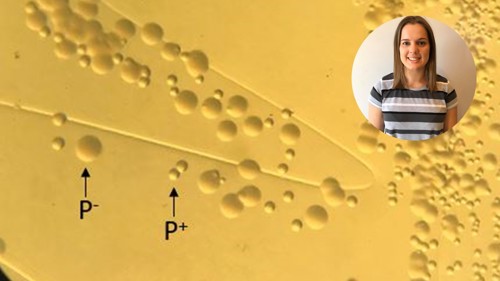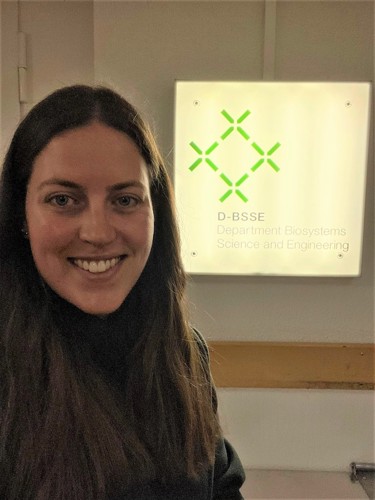Early career researchers spread their wings
With relaxed travel regulations, MWC resumed support for ECR visits to international laboratories. These visits help progress research in new directions, extend networks, and bring new skills and knowledge back home.

Neisseria gonorrhoeae under the microscope, with labels of the two different morphological states: Non-piliated (P-) and Piliated (P+). Insert: Emma Walker. Images courtesy of Emma Walker.
Two early career researchers from the University of Waikato were the first in 2022 to take up this opportunity to access specialist facilities and training overseas.
Emma Walker, who is undertaking fundamental research in Neisseria gonorrhoeae with a dedicated team lead by Dr Jo Hicks in Hamilton, spent five weeks in Professor Maggie So’s laboratory at the University of Arizona, Tucson, where she unlocked the ‘trade secrets’ of studying the fastidious human pathogen, Neisseria gonorrhoeae. Emma worked alongside laboratory manager Dr Maria Rendon and post-doctoral fellow Dr Kate Rhodes to learn how to genetically manipulate and efficiently grow the Neisseria gonorrhoeae organism in culture, and how to carry out host cell association assays including, adhesion, invasion, and intracellular survival.
Prior to Tucson, the New Zealand team had difficulty genetically manipulating Neisseria gonorrhoeae — a critical starting point before progressing to fundamental experiments to unravel how genetic manipulation affects the pathology of the pathogen. In the So Laboratory, Emma learnt the fundamentals of working with the organism and achieved her major goal of successfully complementing her laboratory’s knock‑out strains. Success came down to the morphological status of the Neisseria colonies that were used for transformation.
“Under the microscope their Neisseria gonorrhoeae looked very different to what we were working with in New Zealand. We noticed a key difference in the piliation status.”
‘‘Beautifully piliated” strains have since been established in the Hamilton laboratory.

Annmaree Warrender.
Annmaree Warrender’s goal is to identify antibodies with potential for vaccine and therapeutic candidates. A three-month visit to Professor Sai Reddy’s laboratory in ETH Zurich Basel, Switzerland advanced her work investigating human IgG antibody diversity and determining the effects of the genetic variation.
Difficulty in throughput was a factor limiting research progress in New Zealand. In the Reddy laboratory, Annmaree worked with post-doctorate fellow and Harvard graduate, Dr Eddie Irvine, to learn skills in synthetic immunology and develop methods to screen many modifications in high throughput. She trained in Deep Mutational Scanning of monoclonal antibodies and established a workflow for assessing the affinity profiles of the mutagenic libraries. She also gained access to an Octet Red system that uses Biolayer Interferometry (BLI) technology to evaluate antibody binding interactions in a massively parallel fashion.
“We can implement these techniques in New Zealand to accelerate our project and expand research opportunities to investigate mutations of different types of antibodies and proteins.”
The visits spurred ongoing collaboration and a joint project with Dr Kelton’s laboratory and the Sai Reddy laboratory has been established to advance research in genetic variation engineering.
Emma and Annmaree have shared their experiences and training with the MWC community online at the MWC Emerging Researcher Showcase in February 2023, as well as with the Hicks Laboratory Group and the Proteins and Microbes Group at Waikato University.